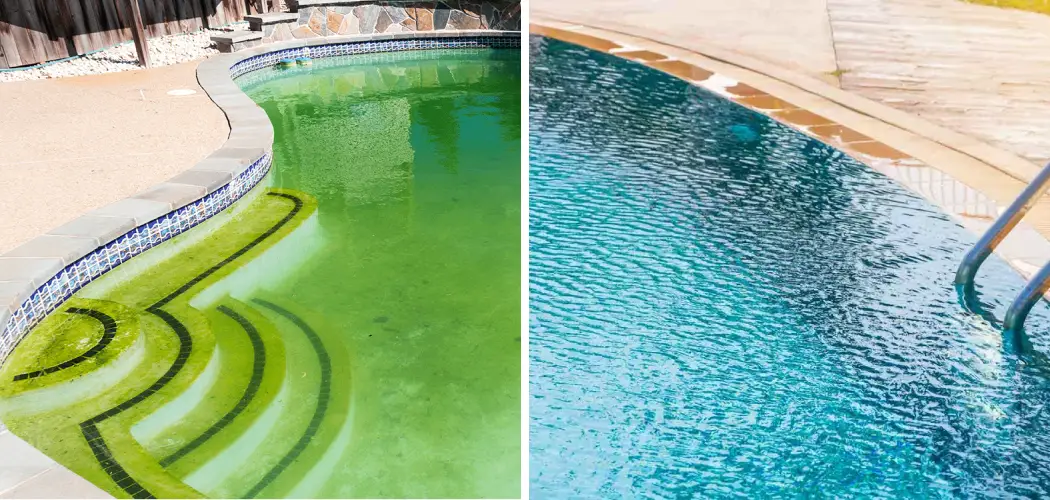Are you trying to get your pool clean and clear, but don’t feel like waiting days for the water to look its best? Perhaps you are hosting a pool party this weekend and need it to look sparkling fast! There is no need to panic; with just a few simple steps, you can make your pool water crystal clear quickly.
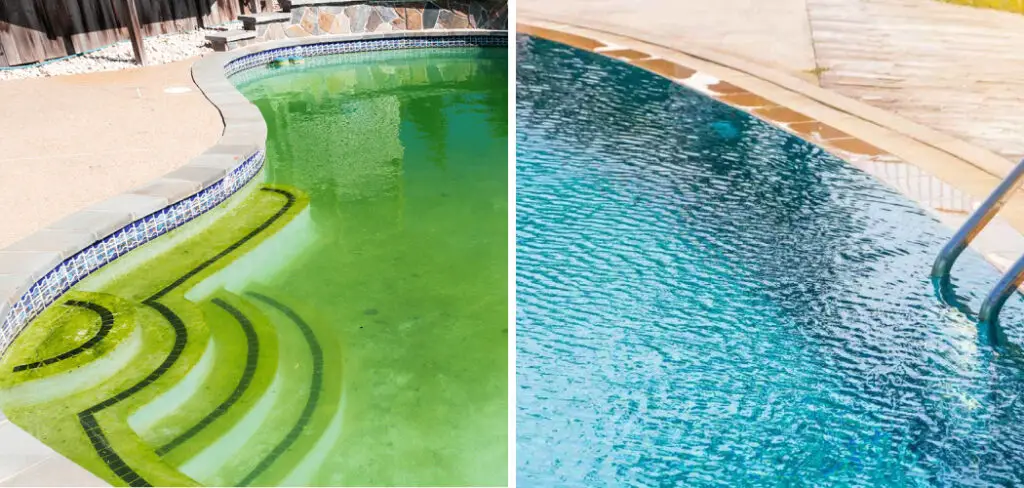
In this blog post, we’ll talk about how small changes can make big differences in getting your pool back on track and ready for swimming. Keep reading if you want to learn some practical tips on how to make pool water clear fast so that you can enjoy it again as soon as possible!
Why is my Pool Water Cloudy?
Before we dive into the solutions, it’s crucial to understand why your pool water may be cloudy in the first place. Cloudy pool water can be caused by a variety of factors, including improper chemical levels, poor filtration and circulation, environmental factors such as debris or rainwater, and even swimmers’ body oils and lotions. Additionally, algae growth can also contribute to cloudy water. Understanding the root cause of your cloudy pool water is essential to know which approach will work best for clearing it up quickly.
9 Best Ways on How to Make Pool Water Clear Fast
1. Skim and Brush the Pool:
One of the simplest ways to clear up your pool water quickly is by skimming and brushing it. Removing leaves, debris, and other particles from the surface can prevent them from sinking to the bottom and making your pool cloudy. Also, brushing the walls and floor of your pool can help dislodge any dirt or algae that may be stuck there, allowing the filtration system to remove it more efficiently.
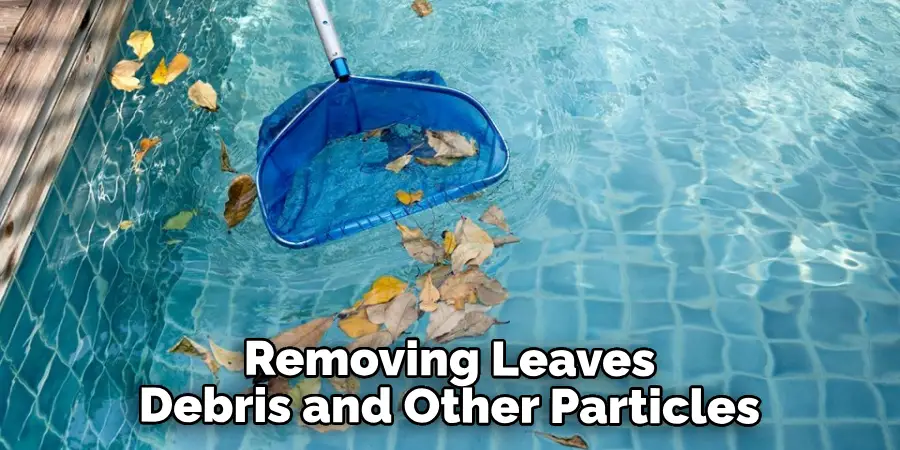
2. Shock your Pool:
If your pool water is cloudy due to algae growth or high levels of bacteria, shocking your pool can help eliminate the problem. Shocking involves adding a large amount of chlorine or other sanitizer to your pool, effectively “shocking” the water and killing off any contaminants. It’s essential to follow the manufacturer’s instructions when shocking your pool, as too much or too little can be ineffective.
3. Correct Chemical Balance:
As mentioned earlier, improper chemical levels can contribute to cloudy pool water. Testing your pool regularly and correcting imbalances can help keep your water clear in the long run. However, if you need a quick fix, adding a clarifier or flocculent to your pool can help clear it up fast. These products work by attracting particles and clumping them together, making them easier for the filtration system to remove.
4. Run the Pool Filter:
Running your pool filter continuously can also help clear up cloudy water faster. The longer your filter runs, the more debris and contaminants it can remove, leaving you with cleaner and clearer water. It’s recommended to run your filter for at least eight hours a day, but during times of high pool usage or if your water is particularly cloudy, running it for longer can be beneficial.
5. Backwash and Clean the Filter:
If your pool water is still cloudy after running the filter for an extended period, it may be time to backwash and clean your filter. Over time, filters can become clogged with debris, reducing their efficiency in removing contaminants from the water.
Backwashing involves reversing the flow of water through the filter to flush out any trapped particles. Additionally, cleaning or replacing your filter’s cartridges can also help improve its performance.
6. Add Pool Flocculant:
In addition to using clarifiers, another option for clearing up cloudy pool water is to use a flocculant. Unlike clarifiers that clump particles together and make them easier to filter out, flocculants cause the particles to sink to the bottom of the pool, making them easier to vacuum or manually remove. However, keep in mind that this method can make your pool’s water cloudy temporarily before it clears up.
7. Keep an Eye on the Water Level:
If there is a lot of rain or heavy pool usage, the water level in your pool may increase. As a result, the chemicals and filtration system can become less effective at keeping your pool clear. It’s essential to monitor your water level and make sure it stays within the recommended range. If it’s too high, you can use a submersible pump to drain some water or backwash your filter more frequently.
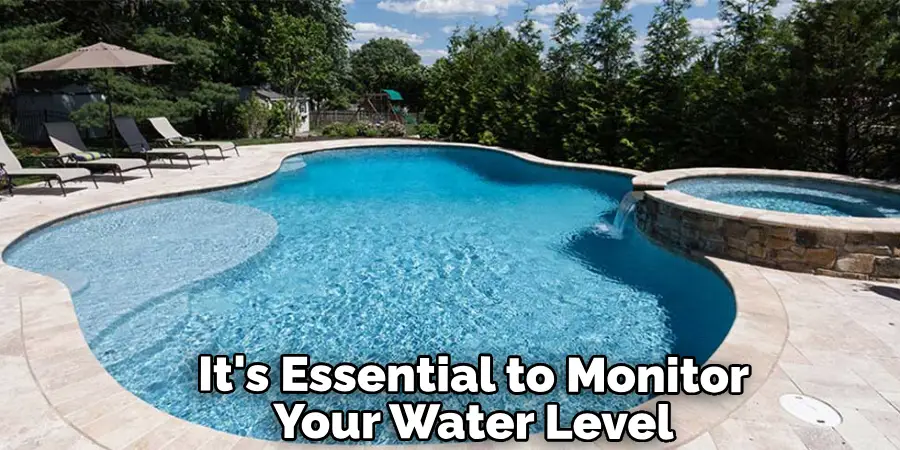
8. Use a Pool Cover:
During periods of heavy pool usage or when you’re not using your pool, using a pool cover can help prevent debris and other contaminants from entering the water. A cover can also help retain heat and reduce evaporation, keeping your pool cleaner for longer. Using a pool cover can also save you time and effort in cleaning and maintaining your pool.
9. Call a Professional:
If you’ve tried all the above methods and your pool water is still cloudy, it may be time to call in a professional. A pool service technician can identify the root cause of the problem and provide more targeted solutions to clear up your pool quickly and effectively. Make sure to do your research and hire a reputable company with experience in dealing with cloudy pool water.
Following these tips and regularly maintaining your pool can help prevent cloudy water in the future. Remember to test your pool regularly, keep up with proper chemical levels, and clean or replace your filter as needed. With a little effort and care, you can enjoy crystal-clear pool water all season long! Happy swimming!
Additional Tips and Tricks to Make Pool Water Clear Fast
- If you have a sand filter, backwash and rinse the pool after adding any chemicals to ensure they are properly distributed.
- If you have a cartridge filter, clean or replace it if necessary. This will help to prevent the build-up of debris and keep your pool water clear.
- Consider using a clarifier product to help remove fine particles that can cause cloudy water. These products work by binding to the particles making them easier for your filter system to remove.
- Periodically check and adjust your pool’s pH level. The ideal range is between 7.2 and 7.6, which will help keep your water clear and prevent bacteria growth.
- Shock your pool weekly or after heavy use to kill any lingering bacteria or algae that may be present. Follow the manufacturer’s instructions for the product you are using.
- Consider investing in a pool cover to reduce the amount of debris that enters your pool. This can help minimize the amount of cleaning and chemicals needed to keep your water clear.
- Regularly brush and vacuum your pool to remove any dirt or algae build-up. Pay attention to hard-to-reach areas and corners where debris can often accumulate.
- Consider using a robotic pool cleaner to help keep your pool water clear and reduce the amount of manual cleaning required.
- If you have a saltwater pool, check and maintain the salt levels according to the manufacturer’s instructions. Low salt levels can cause cloudy water and high levels can damage equipment.
- Always read and follow the manufacturer’s instructions when using chemicals or cleaning products in your pool. Improper use can result in cloudy water and even harm to swimmers.
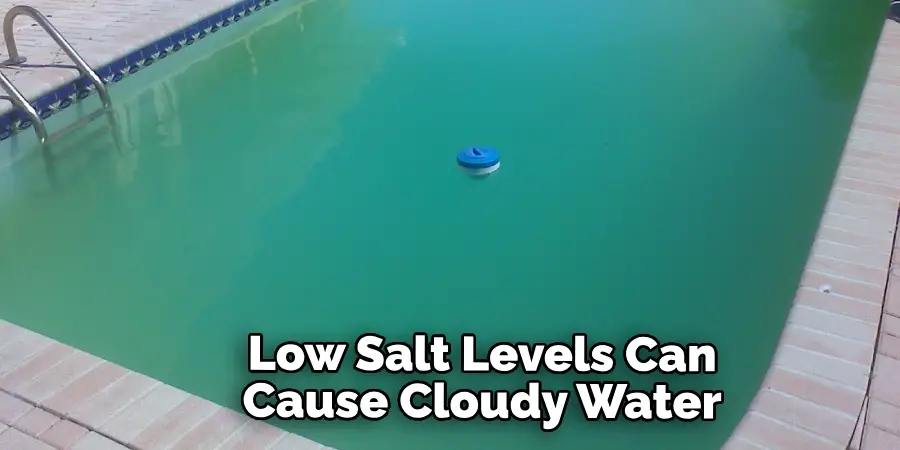
With these additional tips and tricks, you can ensure that your pool water stays crystal clear and safe for swimming. Remember that regular maintenance is key to keeping your pool water clean and inviting, so stay on top of these tasks to enjoy a beautiful and refreshing pool all season long! Happy swimming!
Frequently Asked Questions
How Often Should I Check My Pool’s pH Levels?
Ideally, you should check your pool’s pH level at least once a week. If you notice any changes in the clarity of the water, you should check it more frequently. Keeping a consistent pH level is crucial in maintaining clear pool water.
Can I Use Regular Household Bleach to Shock My Pool?
No, regular household bleach contains additional chemicals that can be harmful to your pool’s delicate balance. It’s important to use specially formulated shock treatments for your pool, as they are designed to maintain the proper chlorine levels without adding any unwanted chemicals.
How Long Should I Wait to Swim After Shocking My Pool?
It is recommended to wait at least 24 hours before swimming after shocking your pool. This allows the shock treatment to fully circulate and dissipate, ensuring that it won’t harm your skin or eyes while swimming.
Can Rain Affect My Pool’s Clarity?
Yes, rain can affect the clarity of your pool water. Rainwater can introduce bacteria and other contaminants into the pool, which can lead to cloudy or green water. It’s important to shock your pool after heavy rainfall and regularly test and balance the pH levels.
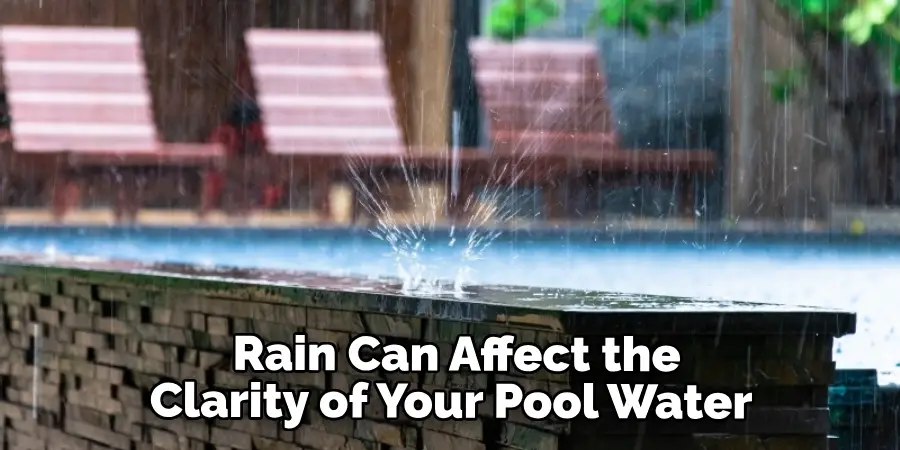
Conclusion
Even with the steps outlined in this blog post, sometimes you need a little bit of extra help to get your pool sparkling clean. Swimming pools can collect bacteria and algae quickly, so regular maintenance and cleaning are essential for any pool owner. If you can’t seem to stay ahead of keeping your pool water crystal clear, it may be time to contact a professional.
A skilled technician should be able to identify easily what is causing cloudy or unbalanced pool water and provide treatment solutions that will make it look new again. So if your pool is looking less than perfect, don’t hesitate – to take advantage of our quick-fix tips on how to make pool water clear fast, or call in the experts for an assessment and suggestions on getting it back up to speed!
About
Outdoor Fixes is a distinguished figure in the world of Diy design, with a decade of expertise creating innovative and sustainable Diy solutions.
His professional focus lies in merging traditional craftsmanship with modern manufacturing techniques,
fostering designs that are both practical and environmentally conscious. As the author of diy,
outdoorfixes delves into the art and science of outdoorfixes-making, inspiring artisans and industry professionals alike.
Education RMIT University
(Melbourne, Australia) Associate Degree in Design (Outdoor Fixes) Focus on sustainable design, industry-driven projects,
and practical craftsmanship. Gained hands-on experience with traditional and digital manufacturing tools, such as CAD and CNC software.
Nottingham Trent University
(United Kingdom) Bachelor’s in outdoorfixes.com and Product Design (Honors) Specialized in product design with a focus on blending creativity with production
techniques. Participated in industry projects, working with companies like John Lewis and Vitsoe to gain real-world insights.
Publications and Impact
In diy, Outdoor Fixes his insights on indoor design processes, materials, and strategies for efficient production.
His writing bridges the gap between artisan knowledge and modern industry needs, making it a must-read for both budding designers and seasoned professionals.

